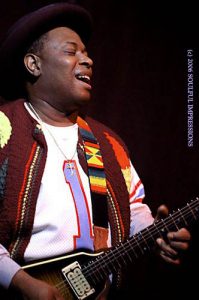Sweet Home: May 2010
Delta Crush Blues

It’s telling that blues guitarist Chainsaw Dupont lists as turning points in his music career not listening to B.B. King as he was growing up in the Mississippi Delta or touring with Junior Wells in the ’90s, but hearing Sly & The Family Stone’s “Thank You (Falettinme Be Mice Elf Agin)” and jamming with Stevie Ray Vaughan. Steeped in classic blues but determined to add a modern twist, Dupont personifies the modern bluesman.
“Growing up in Mississippi, I heard a lot of blues,” says DuPont, who now lives in Evanston. “We listened to a lot of different things; I liked Johnny Cash and Chet Atkins.” Despite hearing music constantly on the Macomb cotton plantation he grew up on — including the boogie-woogie piano playing his mother learned from Fats Domino — it wasn’t until Dupont had moved to Chicago at 14 that he was inspired to become a professional guitar player.
“Me and a friend saw a guy playing Sly Stone’s ‘Thank You,’ it was the slow version,” he says. “We were at a party and I thought it was the most amazing thing I had ever heard. The sound was so unique, the riffs were so catchy. It was 4 in the morning but I borrowed a friend’s guitar and started playing from then on.”
That was 1972, and David “Chainsaw” Dupont has journeyed a long way from the Delta and late-night West Side parties. Noted for his original material and a sound he calls “Delta Crush,” Dupont is at the forefront of bringing authenticity and freshness to contemporary blues. “Delta Crush is industrial, hard-working-type blues,” he explains. “It’s the working-man blues. Looking at it from blues essentials, it’s like a compact version of the Mississippi blues I heard as a kid.”
This month he drops Acoustified/ Electrified, but in February, the 53-year-old released his fourth CD, The Real Guitar Hero (Chicago Blues Records), a collection of 11 live tracks showcasing his guitar chops and tying up all the connections he explored in his street trilogy albums, which highlighted the three major blues cities (Chicago, New Orleans, and Memphis). Poking fun at the video game as well as the “Real Folk Blues” series from the ’60s, The Real Guitar Hero demonstrates Dupont’s skill at both blues preservation and innovation.
Opening with the James Brown classic “Cold Sweat,” Dupont underscores his calling by channeling both Brown and King with hard-driving, funk-drenched riffs. An engaging songwriter, the guitarist couches an uptempo blues groove in a classic blues lament on “Saccharine”: “When I want some sugah baby/you give me saccharine/you seem as sweet as sugah but you ain’t the real thing/Your love is like a booty call that always comes collect/I been paying these charges baby/I ain’t got nothing’ left.”
There’s “N.O.,” a New Orleans tribute with a proper jazz layering and a rather clumsy rap, but perhaps the most striking tune on the CD is an intriguing cover of Smokey Robinson’s “I’ll Be Doggone.” It’s Smokey meets Albert King with a hot blues treatment of Marvin Gaye’s hit where Dupont strips the Motown polish and adds heaping doses of gritty, down-home flavor.
With Albert King and versions of Sly Stone’s funk all over the album, it’s almost the end when Dupont calls up his other influence, Stevie Ray Vaughan, on “Sweet As A Queen Bee’s Honeycomb,” with controlled, yet sizzling guitar riffs.
“I met Stevie Ray in 1981, at Tipitina’s,” says Dupont. “I was homeless at the time and I had been thinking, ‘What am I going to do? There’s so many guitar players out there.’ I had heard a lot about him, that he was the closest thing to Jimi Hendrix and I just walked up to him and said, ‘Hey, I want to play with you.’ He said, ‘Yeah man’ and we played ‘Voodoo Child’ and ‘Superstition.’ Pausing at the memory, Dupont says, “Stevie brought me back to Albert King. He had so much emotion when he played.” It was a hard blow to Dupont when Vaughan died in a helicopter crash in 1990. “I just put my guitar under my bed for two/three months after he passed. I felt his spirit coming to me saying, ‘You can’t stop playing, you got to continue.’ I put The Blues Warriors together shortly after then, in 1991.”
Chainsaw Dupont & The Blues Warriors have been quietly changing the face of urban blues ever since. After years of drifting and searching for his sound, Dupont has firmly established his blues identity from his name — “It takes a long time to cut down a tree with an axe, but a chainsaw is quick” — to his genre-bending, but still blues, music. “I saw a lot of shootings and sadness in Mississippi,” he says. “All of it gets expression in my music. I’m alive and well and able to play my music. What happened in my life experience is just added to the pot. I was born at the right place and time [under the ‘bad sign’ of Friday, August 13, 1957] to sing the blues. I believe it’s my destiny.”
Appearing: 5/21 at Lee’s Unleaded Blues (7401 S. Chicago) and 5/22 on the Chicago Blues Tour pub crawl (www.chicagobluestour.com).
— Rosalind Cummings-Yeates
Category: Columns, Monthly, Sweet Home











